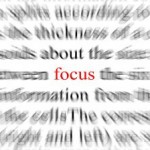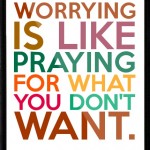 We live in a world with a million possible distractions, pressures, emergencies and interruptions – how can you possibly stay focused on your goals and sane?
We live in a world with a million possible distractions, pressures, emergencies and interruptions – how can you possibly stay focused on your goals and sane?
There are always going to be several things constantly competing for your time – marketing campaigns to design, team members to manage, customers to respond to, business opportunities to explore, issues to follow up, personal commitments etc. However, whenever you try to work on too many things at the same time, inevitably none of them ever gets done. Business success often comes down to focus.
To assist my clients in staying on track and keeping things simple, I developed the following list of 5 simple techniques/questions to put things into perspective. When in doubt – check the list for guidance.
1. Has Anyone Died? If not, relax and calm down. As long as no one has died, it’s really not that serious and there is a solution to every challenge you face.
2. Are You Trying to Eat an Elephant in One Sitting? Breaking things into bite sized chunks makes the world of difference. Having broad high level goals are good but having an actionable plan is essential. A detailed, step by step plan can help you to identify how you can get from where you are to where you want to be. Remember, a journey of 1000 miles begins with one step.
3. Are You In A Bad Neighbourhood? If you are not in a good place emotionally, change your physiology immediately. That means get up and get moving, put on your favourite song or do the “dance of joy”. Whatever it takes, do it NOW.
4. Are You Grateful For What You Already Have? It is impossible to bring more of what you want into your life if you are feeling ungrateful about what you already have. It has been said that the whole is more than the sum of its parts. In many ways gratitude is a bit like that – it’s not what you say, the mere words that count, but sum of the words and the heartfelt emotion behind them.
5. Are You focused on What You Want or Don’t Want? Whether we realise it or not, we are visualising things all the time – visualising either what we want or don’t want. If you are relentlessly focused on the negative outcome and are riddled by fear that WILL impact your reality.
It’s very easy to get so caught up in the emotion of emergencies, disruptions and day to day activities that you can easily lose sight of what is most important to your business success and well-being. These simple tips and questions will help you stay more in touch which is what is most essential to you and your compelling future. These techniques (and keeping a sense of humour) are vital to helping you to stay in focus with your ultimate goals and business success.
Article Source: http://EzineArticles.com/2314715
Life isn’t always easy – there can be no question about that. It’s unpredictable and it’s often hard to make sense of what happens. Some of the events in our journey end up being nothing more than minor irritants, while others are more like being hit by a Mack truck at 200 kph.
Regardless – we have to play the hand we are dealt.
Part of the process of coming to terms with whatever occurs in your life is to find a way to make sense of it. If science indicates that objective reality doesn’t actually exist, it is very much up to us to create a reality that helps us move on and find some meaning. As W Mitchell so accurately points out, ‘It’s not what happens to you, it’s what you do about it that matters’.
I like to think of it as choosing to ‘make chicken soup out of chicken shit’. And it is often in these times of desperation or perspiration that we accomplish our greatest achievements. We play the hand that we have been dealt and in so doing we stretch beyond the finite boundaries of probability and skill into the realm of possibility and inspiration.
For Christopher Reeve a random riding accident changed his life. Everything he was in terms of his career and how people perceived him vanished the instant he hit the ground. And yet he was able to muster his resources and master his own mind so as to find a reason to carry on. I’m sure becoming paralysed was not part of his life plan. I’m sure there must have been times that he was angry and bitter, but these feelings obviously didn’t consume him.
The simple truth is that Christopher Reeves found himself in a wheelchair at just 43 years old. Nothing could be done to change that. There was no way to wind back the clock and no way to repair the damage. His condition was permanent. But his state of mind and any negative emotions he felt were temporary and 100% within his control. He had two options: (1) let the event consume his life and extinguish his spirit or (2) accept his condition and make the best use of his time and influence to advance science in the hope that someday others with spinal cord injuries might walk again. In many ways, he became more of a superhero after his accident than he had previously been in his film roles because he created a vision and a purpose that was bigger than the event that changed his life.
He accepted the cards he was dealt in the game of life and he played with the courage, determination and strength of character of a superhero. Perhaps Christopher himself said it best, ‘I think a hero is an ordinary individual who finds the strength to persevere and endure in spite of overwhelming obstacles. They are the real heroes, and so are the families and friends who have stood by them.’
TODAY – is the perfect time for you to stand back and celebrate the superhero within yourself and others. If you choose to play the hand you’ve been dealt to the best of your ability…I think you will look back [someday] and agree that the “game” was worthwhile.
Article Source: http://EzineArticles.com/2314703
 Have you ever heard somebody say to another person “Don’t spill that coffee” and seen that exact thing happen, that you know will happen…. which is that they do spill the coffee by accident!
Have you ever heard somebody say to another person “Don’t spill that coffee” and seen that exact thing happen, that you know will happen…. which is that they do spill the coffee by accident!
Right now you are laughing because it is funny. It is funny because it happens all the time. And if you are still laughing it may be because you are masterful at getting what you don’t want?
For some reason it seems the more you tell someone NOT to do something, the more likely it is that it WILL happen. Why is that? Sometimes we attribute it to simple disobedience – for example a child testing a parent, when the parent has said “don’t do that.”
However, it is more than just a simple testing of the boundaries. There is a biological, scientific reason for getting what you don’t want and it has to do with the way that our brains are wired.
So why do we always seem to do the very thing that we are told not to do?
Our Subconscious brain struggles to process negatives. In effect it hears and acts upon the command to do the very thing that we DON’T want it to do – i.e. “smoke” or “spill the coffee.”
In fact, the subconscious mind cannot think – it can only ACT or CREATE based upon what is of VALUE. That value is a product of our map of reality and every event we have experienced over a lifetime. The subconscious is actually 100x more powerful than the conscious mind and the subconscious is an AUTOMATIC mechanism. It kicks in and acts about 1/2 second before the conscious mind does – so if your embedded beliefs, attitudes, values etc. are negative, you end up always getting what you don’t want.
If you say to yourself over and over “Don’t spill the drink” or you tell a child “Don’t miss the ball”, you are focusing the attention of the subconscious mind on the opposite of what is desired. Instead of saying “carry the drink safely to the counter” or “hit the ball son”, you have commanded the automatic mechanism to do exactly what you DON’T want. The automatic mechanism of the mind is focusing on missing the ball. It’s not that the mind doesn’t hear the word “Don’t” (or cannot understand it) it’s that the ENTIRE SENTENCE is designed to create the opposite of what is wanted. You have to look at the sentence in its entirety to understand why it will not work to create the desired effect.
That is in fact why many books self help books, DVDs and audio CDs DON’T work to deter unwanted habits and behaviours. Many of the NLP and hypnosis practitioners have loaded their materials with embedded commands like “you will not have any problems sleeping”, “you will not want to have any more cigarettes” or “you will no longer have cravings for fried chicken and beer”. Unfortunately, these programs are doomed from the start. They only serve to further entrench these undesirable patterns.
If you want to change behaviour or get around a problem you must think of new ways to phrase the desired behaviour in a positive way. This requires the removal of all negatives or references to the problem in the sentence. Rather than saying “Don’t mess up the calculations” you could say “Be careful to ensure all the calculations in the spreadsheet are double checked and correct”. Instead of saying to your child “Don’t throw that toy at your sister” you should say “Put the toy down now and come to me”.
Instead of telling yourself what NOT to do, focus exclusively on what you want do to (or have happen). It can be difficult for some to unlearn old patterns and pessimistic language. However with practice and the positive reinforcement that comes from achieving the results that you desire most, you will find yourself speaking and behaving in new and empowering ways.
Article Source: http://EzineArticles.com/3142214
17 Oct 2011
What’s The Best Way to Break a Bad Habit?
Without a doubt, the number #1 question I get asked by clients is ‘how do I break a bad habit like procrastination, worry, insomnia, negative thinking or smoking’? There are a million examples of ways that each one of us holds our own success back by ‘doing’ unproductive habits. To make lasting change to deeply ingrained bad habits using willpower and positive affirmations alone is not realistic.
Everyone knows that positive thinking is undependable and produces inconsistent results, at best. The self-image on the other hand underpins our level of emotional intelligence (EQ), which is now recognised as being an even more important measurement for success than the IQ. It has been scientifically proven that our brain circuits take engrams or memory traces, and produce neuro connections only if they are bombarded with the information for 21 days in a row. This means that our brain does not accept ‘new’ data (ie break a bad habit) unless they are repeated each day for at least 21 days, without missing a day.
If you want to break bad a habit like refusing to let go of the past, spending all your time worrying about what might go wrong, overeating, biting your nails or spending more than you earn, it can be done but it will require consistent effort on your part, every day for at least 21 days. In order to do it, your success rate will improve significantly if you can replace that old habit you no longer need with a good and productive habit that will support you to achieve your goals and find someone to help keep you accountable.
And remember, no matter where you are in your life right now — the choices you have made or the experiences you have had — you can break a bad habit because it is never too late to become the person you were meant to be!
09 Oct 2011
How To Forgive and Let Go of The Past
It is very possible that the concept of forgiveness may be the most misunderstood and underutilized skill in the human experience. In the Greek language, forgiveness is the same word as release or letting go. This definition conjures up sensations of liberation, capitulation and freedom. On paper, it reads like a natural and benevolent process – something one freely GIVES to another to release yourself and others from the past. In practice however, it is often misunderstood as something that someone who has done us wrong must ASK of us.
The most precious gift that we have is our breath – without it, we would simply die. We can live for a short time without food, water, love and light but we cannot live for more than a minute or two without air. Breathing in and exhaling signifies the natural inevitability of the cycle of life: We take into our bodies the oxygen we need to live and we release or let go of carbon dioxide and other by-products that no longer serve us.
Our experience of life bears a striking resemblance to this natural process. We are constantly taking in the world around us and our interactions with others produce a myriad of consequences – some are positive while others are not. Unfortunately, negative or hurtful experiences are inevitable. As human beings we all have the same capacity to inflict harm through our words, actions and inactions, whether knowingly or unknowingly. But we all know that we cannot hold our breath forever; the release of by products and things that no longer serve us is an instinctive function. By the same token, sooner or later we all must discover our innate capacity to forgive.
Forgiveness, like exhaling, is an act of faith. It can neither be stopped nor compelled. There is no proof that peace will follow or that the release from anger, vengeance or self-righteousness will be immediate.
On our deathbed, I doubt any of us would say ‘I wish I held onto more anger and resentment or took a bit longer to forgive.’ In fact, if you were to look out into the future and imagine the world and all of your relationships from a position where you knew with absolute certainty that they would be gone tomorrow, would you act differently today?
Would you regret not having closure? Would you mourn the years that you kept yourself enslaved by bitterness, blame and indignation? Would you lament the loss of pleasure, love and peace that could have been yours if only you could have found a way to forgive sooner? Does the thing that you are fighting or obsessing about now really even matter in the grand scheme of things?
We all know our own pain – we are intimately familiar with the injustices that we have suffered, the crosses we have had to bear and the countless nights that we have cried ourselves to sleep. What we don’t fully grasp is the depth of another’s pain – the unspoken abuse, neglect, prejudices, anguish, loss, torment or afflictions. At the time, we think we are the only ones who are hurting and we forget that the scars and burdens of others are not always visible on the outside. We can never truly know another’s plight until we have walked a mile in their shoes. I believe that the first step toward forgiveness is simply the willingness to take one’s own shoes off and put another’s on. The rest can be surprisingly easy.
To learn more about forgiveness I recommend that you read On The Shoulders of Giants. In Chapter 28, I explain in detail exactly how I learned to forgive the four boys who were responsible for the murder of my mother several years ago in Canada. I know first-hand how difficult it can seem to forgive but I also know the awesome release, strength and freedom that can come from the ultimate gift of love – forgiveness of yourself and others.
Haven’t you already waited long enough to be released from those old emotions that no longer serve you? When is now a good time to change and to move forward toward your bright and compelling future?










